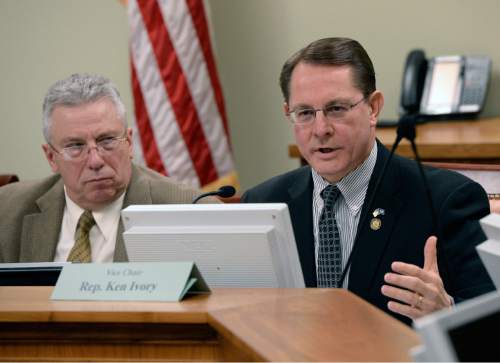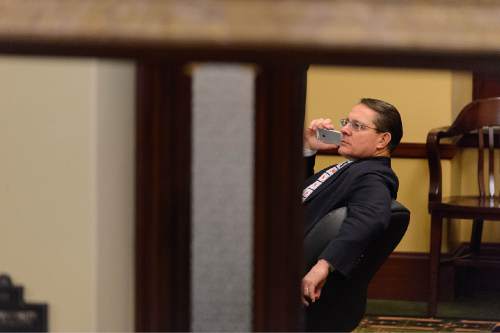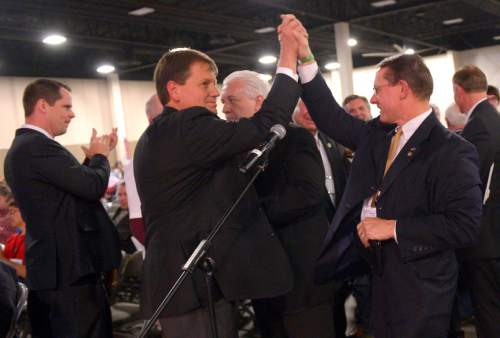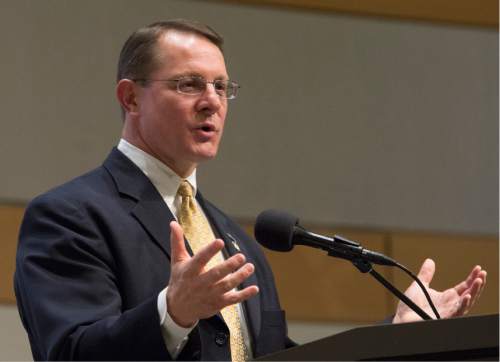This is an archived article that was published on sltrib.com in 2016, and information in the article may be outdated. It is provided only for personal research purposes and may not be reprinted.
An attorney general's investigation into state Rep. Ken Ivory focused on whether the West Jordan Republican was defrauding counties by promising to help them gain control of federal lands while taking most of the money raised by the nonprofit American Lands Council in salaries, including for Ivory and his wife.
The attorney general's office ultimately decided in September to close the case, after an investigator found that the counties that had given money to the American Lands Council (ALC) didn't feel cheated and were satisfied with the group's work.
And, under Utah law, there are no restrictions on what percentage of the money raised by a nonprofit goes toward salaries, nor requirements that legislators register as lobbyists when they advocate on particular issues, the attorney general said.
The contours of the 3 1/2-month-long probe were contained in more than 500 pages of investigative documents newly obtained from the attorney general's office by The Salt Lake Tribune through an open records request.
The attorney general's office announced in October that a team of prosecutors concluded "independently and collaboratively this case lacks a reasonable likelihood of conviction."
At that time, Ivory said he expected that outcome.
"You have desperate, shadowy D.C. groups that are afraid that they're going to lose their stranglehold over the Western lands and they resort to these sorts of shady tactics," Ivory said.
The public lands issue has been at the forefront in the Utah Legislature since 2012, when Ivory sponsored the Transfer of Public Lands Act, demanding that Congress turn over ownership of federal lands to the state.
The idea, which dates back to the Sagebrush Rebellion of the 1970s, sparked the creation in 2012 of the ALC, which has sought funding from various county commissions around the West and private businesses to enlist support for the idea of states taking ownership of federal land.
Late last year, the Commission on Stewardship of Public Lands, created by the Utah Legislature, recommended the state file a lawsuit — at a projected cost of $14 million — demanding the federal government turn over the Western lands.
And in Oregon, an armed militia group has holed up in the headquarters of a wildlife refuge demanding local control of the federal lands.
The Ivory investigation was initiated last June by a complaint from Anne Weisman, executive director of the Washington, D.C.-based Campaign for Accountability, who claimed Ivory was committing fraud by raising money promising counties they could take control of federal lands using a legal argument that Ivory should have known was almost certainly unconstitutional.
The investigator interviewed commissioners from seven Utah counties that have given money to Ivory's ALC about their experience with the group, and all seven said they were familiar with the mission of the group.
Only a Utah County Commissioner expressed some concerns about the extent to which the group's work overlapped with Ivory's role as a state representative and that the group's mission might conflict with Rep. Rob Bishop's Public Lands Initiative — an attempt to negotiate federal legislation to resolve land disputes.
An auditor at the Department of Commerce told investigators that the salaries paid to Ivory and others did not raise red flags for the department. The ALC's 2012 and 2013 tax returns showed that, of the $336,000 the group spent in the two years, $227,000 was spent on staff salaries and benefits.
Ivory and his wife, Becky, were paid a combined $155,000 over the two-year period, the records showed.
And Spencer Hadley, an administrator with the state elections office, said that legislators are not required to register as lobbyists in order to advocate for particular issues.
Sen. Howard Stephenson, R-Draper, is registered as a lobbyist for the Utah Taxpayers Association, a business-backed tax policy group on which he serves as president. He has frequently sponsored tax legislation. Rep. Timothy Hawkes, R-Centerville, was a registered lobbyist for the conservation group Trout Unlimited until he was elected to the Legislature in 2014. He continues working for the nonprofit as Western agriculture and water policy counsel, but has not sponsored legislation related to its conservation mission.









